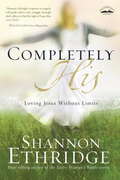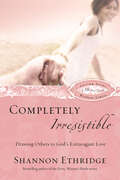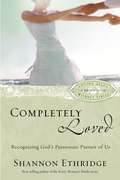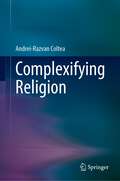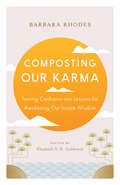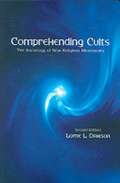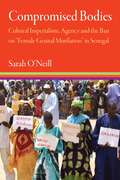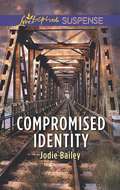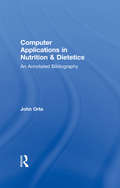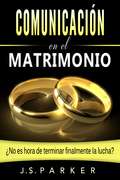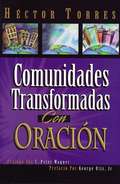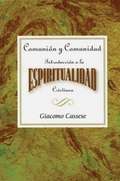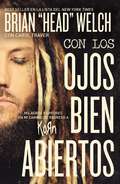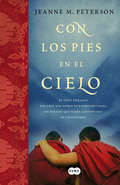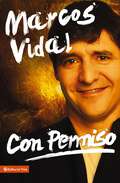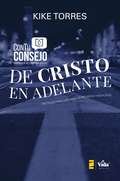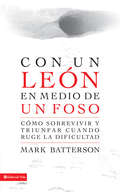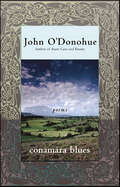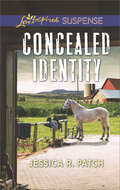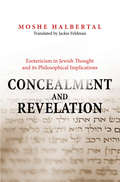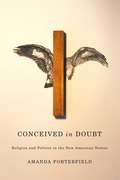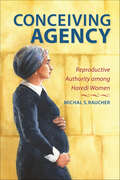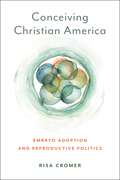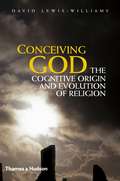- Table View
- List View
Completely His: Loving Jesus Without Limits
by Shannon EthridgeLet your soul be stirred by an extraordinary love. What would it be like to know without even a glimmer of doubt that you are loved–truly, passionately, deeply–just as you are? Can you imagine your heart being completely entwined with one whose every word to you reveals tender affection? When an unimaginable accident forced then-sixteen-year-old Shannon Ethridge to consider if such an intimate, meaningful soul connection was even possible, she discovered this incredible truth: The Creator of the universe woos and pursues you with unimaginable passion. He longs for you to becompletely His. As she reveals, for the first time ever in print, the details of her dramatic, face-to-face encounter with the Lover of her soul, Shannon points the way toward a satisfying, vibrant relationship with Jesus. Completely Hisand the companion devotionals in the Loving Jesus Without Limits series combine practical insights with powerful personal stories from women just like you to help you embrace your true worth and lead you into a life of greater joy and purpose than you’ve ever thought possible. As you catch a glimpse of Christ’s unfathomable love, your own spiritual passion will be awakened and you’ll be inspired to embrace your role as His bride, fully and completely His–without limits. Why settle for less than the lavish love relationship you’re designed to enjoy?
Completely Irresistible: Drawing Others to God's Extravagant Love (Loving Jesus Without Limits)
by Shannon EthridgeDiscover the sheer joy of sharing God's love. Just as a woman in love delights in telling others about her beloved, a woman in love with Jesus finds indescribable joy in introducing others to Him. Yet the very idea of evangelism leaves many feeling inadequate or fearful. In this encouraging devotional, best-selling author Shannon Ethridge points to examples of New Testament believers to show how any woman can confidently share her faith. Through the stories of these early saints, you’ll learn that drawing others to Christ doesn’t have to involve specific steps or persuasive words. In fact, when God’s love fills your heart, it overflows naturally into the lives of those around you and creates in them an irresistible yearning to experience it for themselves. This companion devotional to Completely His directs your gaze into the heart of God through the truths revealed in His love letter, the Bible. Each reading includes introspective questions to help you apply those truths in a personal way, propelling you into a more fulfilling life of passion, purpose, and genuine intimacy with Jesus.
Completely Loved: Recognizing God's Passionate Pursuit of Us (Loving Jesus Without Limits)
by Shannon EthridgeDid you know that God is pursuing you, not out of anger or disappointment but because He desires an intimate relationship with you? The Creator of the universe invites you to walk and converse with Him, and this devotional serves as your daily meeting place. In each brief reading, best-selling author Shannon Ethridge leads you to consider Old Testament stories in a new light to learn how God interacts with His people and what that reveals about His character. Most important, as you discover more about God's true nature, you'll begin to recognize the ways He daily touches your life and draws you closer into His loving embrace.This companion devotional to Completely His directs your gaze into the heart of God through the truths revealed in His love letter, the Bible. Each reading includes introspective questions to help you apply those truths in a personal way, propelling you into a more fulfilling life of passion, purpose, and genuine intimacy with Jesus.From the Trade Paperback edition.
Complexifying Religion
by Andrei-Razvan ColteaThis book provides an original and challenging perspective of religions as abstract complex adaptive systems, using an interdisciplinary approach to try to understand what religions are and how they function, two fundamental issues which, despite an intense struggle from several fields, have not yet been resolved. What is the source of religious belief? How do religions work and what are they made of? Why is religion so important for us that it has survived centuries of scientific progress and secularization? Why are people religious even outside religion? The book addresses these questions using an interdisciplinary approach that seeks to untangle the Gordian knot of defining religion. In short, they can be considered entropy-reducing technologies. What differentiates them from other meaning-producing systems is their configuration which employs specific building blocks as tools for mitigating entropy, which are also subsystems and combine in various ways to build a unique configuration: rituals, myths, taboos, supernatural agents, authority, identity, superstitions, moral obligations, afterlife beliefs and the sacred. As a reaction to perturbances or pressure, systems can collapse. Inspired by Nicholas Nassim Taleb, it is, in this book, referred to as fragility—the negative reaction of systems to random events, and four parameters can be used to evaluate it in religious systems: monotonicity (the inability to learn from past mistakes), coupling (linking with other systems: such as political or economic), centralization and stress starvation. Several case studies are provided in order to test the theoretical claims made in this book, based on the author's field research in Romania, Japan, North Korea and Mongolia, and offering details that could be of interest to casual readers, students and researchers of religion.
Composting Our Karma: Turning Confusion into Lessons for Awakening Our Innate Wisdom
by Barbara RhodesEngaging teachings on the core Korean Zen practice of &“don&’t-know mind&” that encourage us to cultivate and apply a clear mind, improve our intuition, feel naturally at ease, and generate compassionate wisdom to face whatever arises.Barbara Rhodes (Zen Master Soeng Hyang) offers the core Korean Zen teaching of don&’t-know mind as an antidote to the over-thinking, overly stimulating modern world that is the cause of so much suffering. In this collection of essays, Rhodes shows us that there are ways we can work with, or &“compost,&” whatever we&’ve got in front of us, digest it into energy that can get us through the rough times, and cultivate a satisfying life. &“Don&’t-know mind,&” Korean Zen&’s foremost teaching, points to our clear enlightened mind before suffering arises based on concepts and judgments of like and dislike. While simple, it is a lifelong exercise, with immediate benefits that get deeper with practice. By applying don&’t-know mind to meditation, everyday existence, and life&’s challenges, readers will learn to work with their own mind&’s reactions to things; trust their intuition; perceive situations clearly; and act with natural courage, compassion, and enthusiasm. Rhodes offers fascinating insights from her professional life as a nurse; her commitment to engaged Buddhism; her life experience as a member of the LGBTQ community; her use of psychedelics on her spiritual path; and more. Readers will appreciate her down-to-earth wisdom, compassion, enthusiasm, and faith in the power of this practice. This book includes an afterword by Dae Bong Sunim, a guiding teacher at Musangsa Monastery in Korea.
Comprehending Cults: The Sociology of New Religious Movements
by Lorne L. DawsonComprehending Cults, Second Edition, provides a sociological interpretation of the phenomenon of new religious movements. While the author does not offer an apologia for cults--in either a religious or a sociological sense--he does attempt to replace suspicion and misinformation with a greater knowledge of the facts (as best we know them) and a measure of sympathetic understanding. <p><p> Completely revised and updated in this second edition, the book examines all aspects of cults, while striving to delineate the very real limits of our knowledge. In addition to dealing with the troublesome aspects of the subject, including issues of violence, sexuality, and brainwashing, the author also considers the possibility that new religious movements are a source of spiritual satisfaction to their members. Offering up-to-date social science research about contemporary religious cults, Comprehending Cults, Second Edition, is ideal for undergraduate sociology of religion and new religious movements courses.
Compromised Bodies: Cultural Imperialism, Agency, and the Ban on “Female Genital Mutilation” in Senegal (Contemporary Ethnography)
by Sarah O'NeillThis ethnography unravels the continuing political tensions surrounding Senegal’s 1999 national ban on “female genital mutilation”The Senegalese parliament authorized a national ban on “Female Genital Mutilation” in 1999. Because only a third of the Senegalese population practiced female genital cutting (FGC) at the time, policy makers did not expect that the new law would cause controversy or provoke commotion. Yet, in Fouta Toro and among Fulani, who traditionally practiced FGC, the response to the new law was fury, and frustrations often turned violent. More than a decade after the ban, Fouta Toro was considered “the most difficult region” for anti-FGC activists, both from inside and outside the government. Tires were burned, international NGO delegates were threatened, and activists publicly speaking out against the practice were religiously condemned. Animosity toward the ban remains palpable in the region to this day. The ban, many (but not all) locals say, is nothing other than an overt act of Western cultural imperialism imposed on their community. For these individuals, resisting the ban is critical for maintaining the autonomy and integrity of a traditional way of life. And from the outside, opposition to the law and NGOs can seem unified.However, anthropologist Sarah O’Neill discovers that on the ground, there are tensions between those who oppose the ban and those who support it—even as that support is nuanced and often complicated. This ethnography unravels the continuing political tensions surrounding both national and international interventions in Fouta Toro and in Senegal that place protection of the female body at the center of their concerns. By way of the many stories of ordinary women and men caught up in debates around the value of the practice and meaning of FGC, Compromised Bodies reveals the personal struggles and difficult decisions Fulani face, be they traditional cutters, religious leaders, mothers, husbands, divorced women, or anti-FGC activists.
Compromised Identity: Faith in the Face of Crime
by Jodie BaileyUNDER SURVEILLANCE Staff sergeant Jessica Dylan confronts a female soldier in the act of stealing her laptop-and almost pays with her life. But a blue-eyed mystery man rushes to her aid just in time, and Jessica learns the handsome army staff sergeant has been investigating her. Sean Turner believes a ring of cyberterrorists who've been attacking military bases are now specifically targeting Jessica. And he's determined to figure out why they are tracking her every move. As the threats against Jessica escalate and attempts are made on her life, Sean vows to stop the hackers. Yet the heart-scarred soldier is set on keeping an emotional distance...especially when they discover what the terrorists are really after.
Computer Applications in Nutrition & Dietetics: An Annotated Bibliography
by John OrtaFirst Published in 1988. Routledge is an imprint of Taylor & Francis, an informa company.
Comunicación en el Matrimonio: ¿No es tiempo de terminar las peleas de una vez por todas?
by J. S. Parker¿Estás buscando una manera para tener una relación más íntima con tu pareja? ¿Tu pareja y tu pelean a menudo por cosas pequeñas y regularmente no se comprenden? Bueno, podrían tener un serio problema en la manera que se comunican, con sus palabras y con sus acciones Presento “Comunicación en el Matrimonio” ¿No es tiempo de terminar las peleas de una vez por todas? Este libro está escrito con el único propósito de unir más a las parejas casadas en su relación mutua con el simple acto de la comunicación apropiada. Ya sea que estés cerca de casarte como si no, o si estas en las etapas tempranas del matrimonio, o haz estado casado por décadas, este libro tiene el objetivo de darte claves que puedes tomar que unirán más a tu matrimonio y se volverá más íntimo que nunca. Te sentirás inspirado para utilizar estas simples pero poderosas claves que podrían potencialmente abrir un nuevo nivel en tu relación. En este libro aprenderás: Herramientas claves de comunicación Como realmente ESCUCHAR a tu pareja Como ser un catalizador hacia un mejor matrimonio Barreras de comunicación que obstaculizan la comprensión efectiva Como mejorar tu vida sexual Como transformar los problemas en oportunidades increíbles Y mucho más. Toma tu copia de este libro hoy y transforma tu matrimonio en uno ¡lleno de pasión, intimidad y amor! ¡Desplázate hasta la parte superior y pulsa el botón "comprar ahora" hoy mismo!
Comunidades transformadas con oración
by Héctor TorresEl autor analiza la estrategia del reino de las tinieblas y señala cómo vestir las armas de luz en esta batalla. Su recorrido por diversos países se América Latina dará al lector las herramientas y estrategias necesarias para transformar las ciudades a través de la oración.
Comunión y comunidad: Communion and Community An Introduction to Christian Spirituality Spanish
by Abingdon Giacomo Cassese“La vida en comunidad es lo más esencial de la espiritualidad cristiana, y es la esencia misma del reino de Dios... La espiritualidad cristiana consiste en un nuevo modo de relacionarnos en amor, pues es precisamente esto lo que claramente distingue a la comunidad creyente de cualquier otra comunidad humana”. Al definir así la espiritualidad cristiana, el Dr. Cassese derriba el obsoleto paradigma que intentaba buscar la perfecta relación con Dios a través del aislamiento, de la pura relación personal e individual con Dios. En particular porque en realidad es en la comunidad donde la espiritualidad se realiza, se prueba, se evalúa, crece y se perfecciona. Este libro, por lo tanto, nos ayudará a comprender y vivir la espiritualidad desde la vida cotidiana en comunidad, desde la inter-relación e inter-acción con nuestros hermanos y hermanas, desde la inmersión profunda en la vida misma.ENDOSO AL LIBRO COMUNIÓN Y COMUNIDADPor Roberto Amparo Rivera, PhD La iglesia como institución tradicionalmente ha reflejado en la práctica las tendencias y valores de la sociedad en que se desenvuelven. Por eso no es de maravillarse encontrar hoy día creyentes individualistas y congregaciones que son más grupos de individuos que comunidades integradas. A pesar de que el amor de Dios, que supuestamente distingue la comunidad, “no busca lo suyo”, los miembros de estas iglesias se preocupan más de sus propios intereses que del bienestar comunitario. En este estado de cosas, el libro Comunión y comunidad, de Giacomo Cassese, es un grito de alerta y una invitación a recobrar el sentido comunitario de la fe cristiana. Hay una opinión generalizada de que la cultura occidental es cada vez más espiritualista. En este contexto, la espiritualidad se mide en términos de prácticas esotéricas de meditación, ayuno, contemplación de la naturaleza y lecturas de documentos misteriosos de religiones orientales. La contraparte cristiana percibe la espritualidad solo en su dimensión vertical; “el alma en relación con Dios”, mientras que el resto de la vida no hace ninguna aplicación a las relaciones diarias con los semejantes. En marcado contraste, Cassese define espiritualidad como un estilo de relacionarse y de vivir en comunidad. Para los cristianos, afirma el autor, espiritualidad conlleva vivir la vida en su plenitud y con propósito. Solo en la comunión con Cristo nos entendemos como personas de comunidad. Y es a partir de la persona de Cristo que descubrimos la dignidad de los demás como personas. Solamente recibiendo a nuestros hermanos y hermanas como regalo de Dios, y experimentando a través de las comunión con ellas y ellos la encarnación de la Trinidad, tendremos la vida en abundancia que el camino hacia Dios promete. Comunión y comunidad es un oasis al espíritu solitario que aun no ha descubierto que su mayor riqueza está en la vida relacional con sus hermanos y hermanas en Cristo. La lectura es amena y fácil de seguir. Cassese se esmera por hacer comprensibles los términos teológicos que emplea. Con marcada paciencia toma de la mano a los lectores y lectoras y les guía con su habilidad característica a través de los caminos de la espiritualidad, dejándoles un sentido de “¡Ahora sí entiendo!” El resumen al final de los capítulos, así como el glosario al terminar la lectura, son ayudas adicionales en caso de que algún lector o lectora las necesite. Definitivamente, el libro de Cassese es un instrumento valioso para la iglesia que quiere vencer el individualismo que destruye las riquezas de vida cristiana en comunidad, el dualismo que hace separación artificial deformadora entre la creación material y el mundo del espíritu, y el pragmatismo que reduce la vida a valores puramente materiales. Cassese combate eficientemente estos tres enemigos acérrimos de la espiritualidad cristiana. Recomendamos a pastoras y pastores, líderes denominacionales, y otras personas responsables de dirigir la vida espiritual de sus respectivas comunidades, que adquieran y distribuyan copias de este libro entre su equipo de trabajo
Con los ojos bien abiertos: Milagros y errores en mi camino de regreso a KoRn
by Brian WelchTras darse cuenta de que estaba estropeando su vida, y peor aún, la de su hija Jennea, debido a sus excesos en las drogas, el alcohol y la fiesta salvaje, Brian "Head" Welch, guitarrista de la banda KoRn, experimentó un impresionante despertar espiritual que le cambió la vida y lo liberó de la subyugación que implican las sustancias tóxicas. Decidió abandonar en 2005 la exitosa banda que había fundado en 1993, para sanarse. Lo que vino a continuación fue una prueba de fuego que duró una década, desde las dificultades de ser padre de una adolescente extraviada en la depresión y la auto-mutilación, a la dura realidad de tocar solo y sobreponerse a la desgarradora traición de un amigo de toda su confianza. En esta inspiradora saga de redención, quizás la más vivificante sea la radical decisión de Brian de reintegrarse a KoRn y reconciliarse con esa tribu de personas a las que alguna vez consideró su familia, en el horizonte musical del metal. Brian volvió a sus raíces musicales con la cabeza clara y el corazón devoto. Aunque su historia es salvaje, hilarante y profundamente conmovedora, el mensaje es simple: Dios te amará en la libertad de ser tú mismo, siempre y cuando mantengas una relación viva con Él y nunca, nunca renuncies a ella.
Con los pies en el cielo: El Tíbet en los años más duros de represión china: un paraíso que puede converti
by Jeanne M. PetersonTíbet, 1954. Un hombre llamado Dorje entra en su casa y se recuesta contra la puerta, mientras su corazón aporrea la madera. Las palabras de despedida del soldado chino todavía resuenan en sus oídos: «Sabemos que eres medio chino. Hemos venido a traer el comunismo a los tibetanos y tú nos vas a ayudar». Emma y Gerald Kittredge son dos cuáqueros que han atravesado el Himalaya a pie y que, imbuidos por la tradición del pacifismo cuáquero, deciden quedarse a vivir en una sociedad que lleva siglos abrazando la no violencia y se instalan al lado de la casa de Dorje. A pesar de que Dorje sabe que es peligroso acercarse a dos occidentales a quienes los chinos llaman «demonios extranjeros», su exotismo y su afabilidad despiertan su curiosidad y terminan entablando una profunda amistad. Con los pies en el cielo es un relato a tres voces sobre la dura represión a la que fueron sometidos los tibetanos por parte de Mao, pero también una historia que reflexiona sobre la amistad, la lucha, las decisiones y el valor de no renunciar a la libertad por el miedo. Opinión:«En este relato angustioso de extranjeros atrapados durante la ocupación china del Tíbet, Jeanne Peterson captura la amargura mientras conserva el contacto con una tristeza más espiritual y un pulso de esperanza. Los sentidos se inundan con los sabores, olores y sonidos que traen a la vida un mundo y una época lejanos».Jonathan Falle, autor de Blue poppies
Con permiso: Cómo vivir un cristianismo real de todos los días
by Marcos Vidal'Con permiso' es una reflexión abierta y sincera sobre la situación real de la Iglesia y la práctica actual del cristianismo. El autor nos traslada algunas preguntas inquietantes y pensamientos desde el corazón, que no pueden dejarnos indiferentes. “A lo largo de mi ministerio he llegado a cometer sistemáticamente dos errores de manera constante: He elevado ciertas ‘formas’ a la categoría de ‘principios’, y he degradado ciertos ‘principios’ a la categoría de ‘formas’”. Desde esta confesión inicial, el autor aborda y analiza seriamente diversos temas retándonos a situarlos a la luz del Evangelio y de la Palabra de Dios, examinando si verdaderamente estamos cumpliendo las instrucciones de Jesucristo para su Iglesia. “Confundir lo emocional con lo espiritual, darle más importancia a ciertas ideas, experiencias, estrategias, o incluso doctrinas, que al propio evangelio de Jesucristo es un error grave. Esta terrible incapacidad de distinguir entre lo esencial y lo secundario nos roba una cantidad enorme de energía, desvía nuestra atención de lo verdaderamente importante, nos resta eficacia como iglesia en el mundo y nos enreda en mil discusiones estériles”.
Con tu consejo. De Cristo en adelante
by Enrique Torres&“Dios me ha dado 4 roles ministeriales en estos años muy claros y marcados: evangelista, ministrar a hombres, pastor y consejero. Fui bendecido al ser formado en un compañerismo en donde me consolidaron la importancia de predicar la Palabra desde el púlpito, pero veía en mi formación y realidad del ministerio un déficit en el aconsejar con la Palabra abajo del púlpito, en hablar la verdad en amor y acompañar a una persona durante su proceso y servirle en ver y experimentar lo que Dios tenía para ellos. Es por eso que cuando Luis Méndez me invitó a que le acompañara a una conferencia de Steve Viars, de repente le puso nombre y apellido a cosas que en mi alma sabía que necesitaba, para servir a Dios. Años después Deepak Reju con la humilde gracia que le caracteriza me desafiaría a empezar a escribir recursos de hispanos, para hispanos. Dios me bendijo con hombres (pastores y consejeros) que han estimulado esto que hoy tienes en tus manos y con quienes estoy profundamente agradecido.Y es que la realidad es que todos somos consejeros, la única pregunta a resolver es si eres bíblico o no. El primero permanecerá y dará fruto, el otro se lo llevará el viento y terminará en la ruina&”.
Con un león en medio de un foso: Cómo sobrevivir y triunfar cuando ruge la dificultad
by Mark BattersonEl remordimiento más grande que tendrás al finalizar tu vida será que los leones no te persiguieron. Miraras hacia atrás con anhelo a los riesgos que no tomaste, las oportunidades que desaprovechaste, los sueños que no perseguiste. Deja de huirle a lo que más te asusta y empieza a perseguir las oportunidades decretadas por Dios que se te cruzan en el camino. Con un león en medio de un foso está inspirado por uno de los actos más valientes pero menos conocido en las Escrituras, un acto audaz y bendito que no dejo remordimientos: «Benaías persiguió un león hasta una fosa. Después, a pesar de la nieve y lo resbaloso de la tierra, el agarro al león y lo mato» (2 Samuel 23:20-21). ¡Desata al caza leones dentro de ti!
Conamara Blues: Poems
by John O'DonohueTranslating the beauty and splendor of his native Conamara into a language exquisitely attuned to the wonder of the everyday, John O'Donohue takes us on a moving journey through real and imagined worlds. Divided into three parts -- Approachings, Encounters, and Distances -- Conamara Blues at once reawakens a sense of intimacy with the natural world and a feeling of wonder at the mystery of our relationship to this world. Whether exploring the silent, eternal memory of Conamara or focusing on the power of language and the vagaries of human need and passion, O'Donohue tenderly reveals the fragile vulnerability of love and friendship. The result is a musical, transcendent, and deeply moving series of poems that exemplifies O'Donohue at his finest.Written with penetrating insight and distilled transparence, Conamara Blues offers a singular and lasting imaginative vision of a landscape of hope and possibility -- powerfully exhibiting the mastery of a poet at the height of his lyric powers.
Concealed Identity: Undercover Protector Buried Memories Concealed Identity
by Jessica R. PatchAn undercover agent puts his life on the line for a drug lord’s beautiful widow in this inspirational romantic thriller.After Holt McKnight’s criminal informant disappears, the DEA agent must go undercover to get close to the missing man’s sister, who may know more than she’s letting on. But when Blair Sullivan’s attacked, it’s up to Holt to protect her—without blowing his cover.Blair isn’t sure she can trust her charming and handsome new neighbor. After all, the last man she fell for was her late husband, and he turned out to be the brother of a ruthless drug lord. Yet when it’s clear the target on her back is somehow linked to her past, she has no choice but to accept Holt’s protection. Even if getting close is the last thing her scarred heart can handle.
Concealment and Revelation: Esotericism in Jewish Thought and its Philosophical Implications
by Moshe HalbertalDuring the twelfth and thirteenth centuries, great new trends of Jewish thought emerged whose widely varied representatives--Kabbalists, philosophers, and astrologers--each claimed that their particular understanding revealed the actual secret of the Torah. They presented their own readings in a coded fashion that has come to be regarded by many as the very essence of esotericism. Concealment and Revelation takes us on a fascinating journey to the depths of the esoteric imagination. Carefully tracing the rise of esotericism and its function in medieval Jewish thought, Moshe Halbertal's richly detailed historical and cultural analysis gradually builds conceptual-philosophical force to culminate in a masterful phenomenological taxonomy of esotericism and its paradoxes. Among the questions addressed: What are the internal justifications that esoteric traditions provide for their own existence, especially in the Jewish world, in which the spread of knowledge was of great importance? How do esoteric teachings coexist with the revealed tradition, and what is the relationship between the various esoteric teachings that compete with that revealed tradition? Halbertal concludes that, through the medium of the concealed, Jewish thinkers integrated into the heart of the Jewish tradition diverse cultural influences such as Aristotelianism, Neoplatonism, and Hermeticisims. And the creation of an added concealed layer, unregulated and open-ended, became the source of the most daring and radical interpretations of the tradition.
Conceived in Doubt: Religion and Politics in the New American Nation
by Amanda PorterfieldAmericans have long acknowledged a deep connection between evangelical religion and democracy in the early days of the republic. This is a widely accepted narrative that is maintained as a matter of fact and tradition--and in spite of evangelicalism's more authoritarian and reactionary aspects. In Conceived in Doubt, Amanda Porterfield challenges this standard interpretation of evangelicalism's relation to democracy and describes the intertwined relationship between religion and partisan politics that emerged in the formative era of the early republic. In the 1790s, religious doubt became common in the young republic as the culture shifted from mere skepticism toward darker expressions of suspicion and fear. But by the end of that decade, Porterfield shows, economic instability, disruption of traditional forms of community, rampant ambition, and greed for land worked to undermine heady optimism about American political and religious independence. Evangelicals managed and manipulated doubt, reaching out to disenfranchised citizens as well as to those seeking political influence, blaming religious skeptics for immorality and social distress, and demanding affirmation of biblical authority as the foundation of the new American national identity. As the fledgling nation took shape, evangelicals organized aggressively, exploiting the fissures of partisan politics by offering a coherent hierarchy in which God was king and governance righteous. By laying out this narrative, Porterfield demolishes the idea that evangelical growth in the early republic was the cheerful product of enthusiasm for democracy, and she creates for us a very different narrative of influence and ideals in the young republic.
Conceived in Doubt: Religion and Politics in the New American Nation (American Beginnings, 1500-1900 Ser.)
by Amanda PorterfieldAmericans have long acknowledged a deep connection between evangelical religion and democracy in the early days of the republic. This is a widely accepted narrative that is maintained as a matter of fact and tradition—and in spite of evangelicalism’s more authoritarian and reactionary aspects.In Conceived in Doubt, Amanda Porterfield challenges this standard interpretation of evangelicalism’s relation to democracy and describes the intertwined relationship between religion and partisan politics that emerged in the formative era of the early republic. In the 1790s, religious doubt became common in the young republic as the culture shifted from mere skepticism toward darker expressions of suspicion and fear. But by the end of that decade, Porterfield shows, economic instability, disruption of traditional forms of community, rampant ambition, and greed for land worked to undermine heady optimism about American political and religious independence. Evangelicals managed and manipulated doubt, reaching out to disenfranchised citizens as well as to those seeking political influence, blaming religious skeptics for immorality and social distress, and demanding affirmation of biblical authority as the foundation of the new American national identity.As the fledgling nation took shape, evangelicals organized aggressively, exploiting the fissures of partisan politics by offering a coherent hierarchy in which God was king and governance righteous. By laying out this narrative, Porterfield demolishes the idea that evangelical growth in the early republic was the cheerful product of enthusiasm for democracy, and she creates for us a very different narrative of influence and ideals in the young republic.
Conceiving Agency: Reproductive Authority among Haredi Women
by Michal S. RaucherConceiving Agency: Reproductive Authority among Haredi Women explores the ways Haredi Jewish women make decisions about their reproductive lives. Although they must contend with interference from doctors, rabbis, and the Israeli government, Haredi women find space for—and insist on—autonomy from them when they make decisions regarding the use of contraceptives, prenatal testing, fetal ultrasounds, and other reproductive practices. Drawing on their experiences of pregnancy, knowledge of cultural norms of reproduction, and theological beliefs, Raucher shows that Haredi women assert that they are in the best position to make decisions about reproduction.Conceiving Agency puts forward a new view of Haredi women acting in ways that challenge male authority and the structural hierarchies of their conservative religious tradition. Raucher asserts that Haredi women's reproductive agency is a demonstration of women's commitment to Haredi life and culture as well as an indication of how they define religious ethics.
Conceiving Christian America: Embryo Adoption and Reproductive Politics (Anthropologies of American Medicine: Culture, Power, and Practice)
by Risa CromerWinner of the 2024 Eileen Basker Memorial Prize from the Society for Medical AnthropologyHow embryo adoption advances the Christian Right’s political goals for creating a Christian nationIn 1997, a group of white pro-life evangelical Christians in the United States created the nation’s first embryo adoption program to “save” the thousands of frozen human embryos remaining from assisted reproduction procedures, which they contend are unborn children. While a small part of US fertility services, embryo adoption has played an outsized role in conservative politics, from high-profile battles over public investment in human embryonic stem cell research to the overturning of Roe v. Wade. Based on six years of ethnographic research with embryo adoption staff and participants, Risa Cromer uncovers how embryo adoption advances ambitious political goals for expanding the influence of conservative Christian values and power.Conceiving Christian America is the first book on embryo adoption tracing how this powerful social movement draws on white saviorist tropes in their aims to reconceive personhood, with drastic consequences for reproductive rights and justice. Documenting the practices, narratives, and beliefs that move embryos from freezers to uteruses, this book wields anthropological wariness as a tool for confronting the multiple tactics of the Christian Right. Timely and provocative, Conceiving Christian America presents a bold and nuanced examination of a family-making process focused on conceiving a Christian nation.
Conceiving God: The Cognitive Origin and Evolution of Religion
by David Lewis-WilliamsA controversial exploration of the origin of religion in the neurology of the human brain. In this book the noted cognitive archaeologist David Lewis-Williams confronts a question that troubles many people in the world today: Is there a supernatural realm that intervenes in the material world of daily life and leads to the evolution of religions? Professor Lewis-Williams first describes how science developed within the cocoon of religion and then shows how the natural functioning of the human brain creates experiences that can lead to belief in a supernatural realm, beings, and interventions. Once people have these experiences, they formulate beliefs about them, and thus creeds are born. Forty thousand years ago, people were leaving traces in the archaeological record of activities that we can label religious, and Lewis-Williams discusses in detail the evidence preserved in the Volp Caves in France. He also shows that mental imagery produced by the functioning of the human brain can be detected in widely separated religious communities such as Hildegard of Bingen's in medieval Europe or the San hunters of southern Africa.
